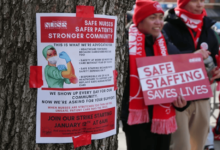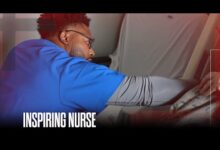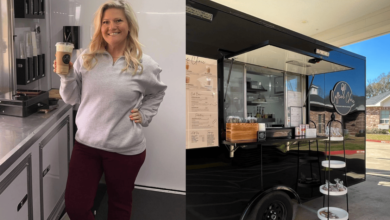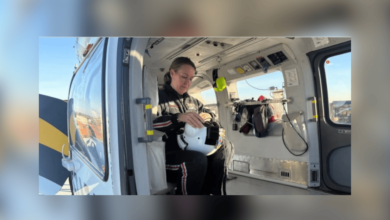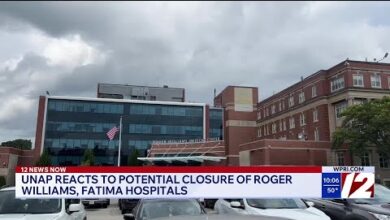Nurse leader calls for greater investment in community innovation
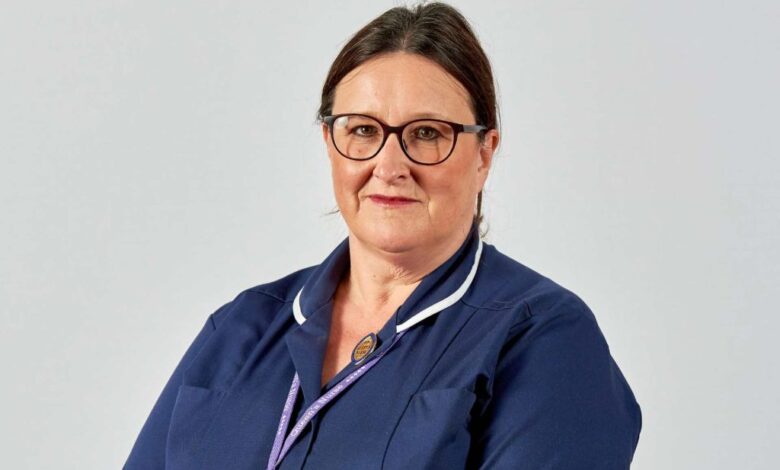
There is so much opportunity for innovation in community nursing, but it must be backed by funding and resources, a leading nurse has said as she reflects on the last two decades in the field.
Steph Lawrence stepped down this month as executive director of nursing and allied health professionals (AHPs) at Leeds Community Healthcare NHS Trust, after six years in post.
“There’s so much more we could do in community, but the resource has to move with it”
Steph Lawrence
Ms Lawrence, who is known nationally for her work representing district nursing, is retiring from senior leadership but planning to stay involved in nursing in other ways.
Marking her retirement from her role, she spoke to Nursing Times about some of her career highlights and challenges, and the hope she has for community nursing in the future.
Ms Lawrence began her nurse training at the age of 18, qualifying in 1990.
She worked as an accident and emergency nurse for 10 years at Airedale NHS Foundation Trust before she switched to community nursing “completely out of the blue”.
“I thought I was going to stay in A&E for pretty much my whole career,” she explained.
“I went from what was a G grade, back in the day before Agenda for Change, and went back to being a D grade staff nurse, and actually it was the best thing I ever did.”
Ms Lawrence worked her way up the career ladder from this point, training to be an advanced practitioner and working for several years leading community teams across Yorkshire.
She then obtained her first senior leadership role in 2013, when she became the executive director of nursing at the former NHS Airedale, Wharfedale and Craven Clinical Commissioning Group.
After three years in post, Ms Lawrence decided she wanted to go back to a provider organisation and was then appointed as deputy director of nursing at Leeds Community Healthcare NHS Trust.
Following this, she was appointed as interim executive director of nursing and AHPs before being appointed substantively in 2018.
As nursing director in Leeds, Ms Lawrence has overseen some pivotal moments in community nursing, including the response to the Covid-19 pandemic.
Despite being in an executive role, Ms Lawrence joined the district nursing team on the front line to support her colleagues.
“I think that showed to me how hard it was for those frontline staff,” she explained.
“They had it really tough, and it was really difficult for them and so emotionally yet physically draining as well.”
Reflecting on the period, Ms Lawrence said nobody realised “just how tough it was” for community staff during the pandemic.
“I’m still a massive advocate for community, and want to keep pushing it”
Steph Lawrence
As the UK was slowly coming out of the pandemic in 2022, the Royal College of Nursing called its first round of strikes in England.
These strikes saw thousands of nurses across the country walk out over pay and working conditions.
During that period, Ms Lawrence again went back to patient-facing work, undertaking visits “to allow others to strike”.
She added: “I think, as a chief nurse, [I was] trying to tread that line of supporting staff and absolutely backing their right to strike.
“But at the same time, it was my accountability and responsibility to keep our patients safe.
“I think, off the back of the pandemic, I found that probably more challenging in some ways.”
Nationally, Ms Lawrence’s work has included leading the trailblazer group that created the district nurse apprenticeship, which she described as one of her “greatest achievements”.
She is also a fellow of the Queen’s Nursing Institute (QNI).
In 2022, Ms Lawrence was awarded a Member of the Order of the British Empire (MBE) for her services to district nursing.
She was presented with the award at Windsor Castle on International Women’s Day, which she said was “an amazing thing to happen”.
Over the last two decades, Ms Lawrence said she had witnessed major changes in community nursing.
“The complexity of patients care has changed beyond all recognition,” she argued.
Ms Lawrence noted that, when she started her career, community nursing care was “relatively straightforward”.
However, as the number of people dying at home has increased, it has had “huge impacts on the complexity of the care” that community nurses deliver.
“We are dealing with acutely unwell people now in the community, and I think that’s changed so much,” she said.
Despite the increased responsibility of these nurses, Ms Lawrence argued that the increased investment was not happening alongside it.
“We’re still operating in circumstances where we can’t always cover the essential care that we need to cover in a day,” she noted.
“There’s more and more expected of us.
“We’re expected to take the category three and four ambulance calls, for example, but we didn’t get any extra funding for that [and] we didn’t get any extra staff.”
Although there are many challenges in the field, Ms Lawrence believes there is so much opportunity for innovation.
“I am absolutely a massive believer that there’s so much more we could do in community, but the resource has to move with it,” she said.
“I think there’s got to be a better way of doing some of this stuff, and with that shift of resource that we need I think it could happen.”
Ms Lawrence appeared hopeful that the new Labour government would bring a renewed focus to community nursing.
It comes as the party pledged in its election manifesto that it would place emphasis on moving healthcare out of hospital where possible and shift more resources into primary care and community services.
In addition, Labour promised to boost the number of community nurses and health visitors, as part of its Building an NHS Fit for the Future plan.
Ms Lawrence said it was imperative to attract more nurses into the community field, if the ambitions of the government are to be realised.
She urged any student or newly registered nurses interested in working in the community to “give it a go”.
“What we hear from student nurses is, once they’ve had a community experience, they don’t usually want to go back into a hospital,” she said.
“So try and push your way into getting a community placement.”
Ms Lawrence said she wanted to challenge the belief that going straight into community nursing would lead students to become “deskilled”.
“That’s just utter rubbish, and just will not happen,” she argued.
“I don’t want it to be a competition, because it shouldn’t be a competition, but it’s equally challenging working in the community.”
Ms Lawrence has only been retired for two weeks, but she said she does not intend to stop working completely.
She has signed up to be a bank nurse at Leeds Community Healthcare, so she can continue to practise as a district nurse.
In addition, she is undertaking some voluntary work for the QNI.
Ms Lawrence said: “I’m still a massive advocate for community, and want to keep pushing it.
“I’ve retired from the job I was doing because that was the right time for me, but I intend to keep my nursing registration.
“I think it’s a bit soon to give up completely.”
